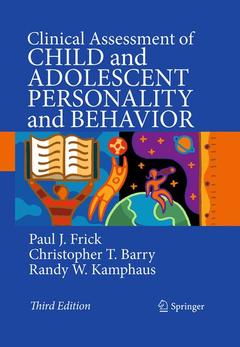Description
Clinical Assessment of Child and Adolescent Personality and Behavior (3rd Ed., Softcover reprint of the original 3rd ed. 2010)
Authors: Frick Paul J., Barry Christopher T., Kamphaus Randy W.
Language: English
Subject for Clinical Assessment of Child and Adolescent Personality...:
Keywords
Assessment; Counseling; Depression; Emotion; Evaluation; Focusing; Rapport; hyperactivity; psychology
89.66 €
In Print (Delivery period: 15 days).
Add to cartSupport: Print on demand
Description
/li>Contents
/li>Biography
/li>Comment
/li>
Psychologists offer an increasing variety of services to the public. Among these services, psychological assessment of personality and behavior continues to be a central activity. One main reason is that other mental health professionals often do not possess a high level of competence in this area. And when dealing with children and adolescents, psychological assessment seems to take on an even greater role. Therefore, it follows that comprehensive graduate-level instruction in assessment should be a high priority for educators of psychologists who will work with these youth.
This textbook is organized into three sections, consistent with the authors? approach to teaching. Part I provides students with the psychological knowledge base necessary for modern assessment practice, including historical perspectives, measurement science, child psychopathology, ethical, legal, and cultural issues, and the basics of beginning the assessment process. Part II gives students a broad review of the specific assessment methods used by psychologists, accompanied by specific advice regarding the usage and strengths and weaknesses of each method. In Part III, we help students perform some of the most sophisticated of assessment practices: integrating and communicating assessment results and infusing assessment practice with knowledge of child development and psychopathology to assess some of the most common types of behavioral and emotional disorders in youth.
A text focusing on assessment practices must be updated every four to six years to keep pace with advances in test development. For example, several of the major tests reviewed in the text, such as the Behavioral Assessment System for Children and the Child Behavior Checklist, have undergone major revisions since the publication of the last edition making the current content outdated. Further, another major test, the Conners? Rating Scales, is undergoing substantial revisions that should be completedbefore publication of the next edition. Finally, the evidence for the validity of the tests and the recommendations for their appropriate use evolve as research accumulates and requires frequent updating to remain current. For example, there was a special issue of the Journal of Clinical Child and Adolescent Psychology published focusing on evidenced-based assessment of the major forms of childhood psychopathology that will need to be integrated into the chapters in Part 3.
This latter point reflects an important trend in the field that should influence the marketing of the book. That is, there are several initiatives being started in all of the major areas of applied psychology (e.g., school, clinical, and counseling) to promote evidenced-based assessment practices. These initiatives have all emphasized the need to enhance the training of graduate students in this approach to assessment. This has been the orientation of this textbook from its first edition: that is, Clinical Assessment of Child and Adolescent Personality and Behavior has focused on using research to guide all recommendations for practice. The ability of the textbook to meet this training need should be an important focus of marketing the book to training programs across all areas of applied psychology.
Randy W. Kamphaus is a Distinguished Research Professor and Head of the Department of Educational Psychology and Instructional Technology at the University of Georgia. In 2003 he received the Russell H. Yeany research award from the College of Education and his second Honors Day Convocation Teaching Award. He is an adjunct faculty member in the neurosciences in education program at the University of Antioquia (Medellin, Colombia).
A focus on issues related to clinical assessment has led Dr. Kamphaus to pursue research in classification methods, differential diagnosis, test development and learning disability and ADHD assessment. He has served as principal investigator, coinvestigator, or consultant on several federally funded research projects dealing with early intervention and prevention, child classification methods, prevalence of ADHD and Conduct Disorder in Latin America, and violence prevention in schools.
As a licensed psychologist and a Fellow of the American Psychological Association (APA), he has contributed extensively to his profession, and he is Past-President of the Division of School Psychology for APA. Dr. Kamphaus has also authored or coauthored 12 books, 5 psychological tests, more than 40 scientific journal articles, and more than 20 book chapters. He also participates in scholarship in the field through work as an editorial board member, associate editor, test reviewer, and newsletter editor. Dr. Kamphaus is a frequent guest lecturer and speaker.
Paul J. Frick is Research Professor of Psychology and Director of the Applied Developmental Psychology Program at the University of New Orleans. Dr. Frick conducts research under the broad rubric of developmental psychopathology. Dr. Frick’s research focuses on understanding the many interacting causal factors that can lead children and adolescents to have serious emotional and behavioral problems and using this research to a) enhance the assessment anddiagnosis of ch




